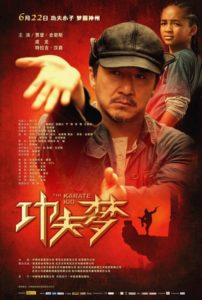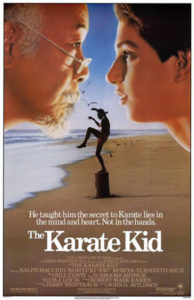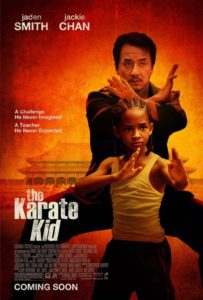The Karate Kid
功夫梦
US/China, 2010, colour, 2.35:1, 140 mins. (US)/132 mins. (China).
Director: Harald Zwart.
Rating: 5/10.
Beijing-set remake of the 1984 film looks lush but is dramatically bland and culturally problematical.
Beijing, the present day. Some time after the death of his father, 12-year-old Dre Parker (Jaden Smith) and his mother Sherry (Taraji P. Henson) move from Detroit to Beijing, where Dre Parker enrolls in the multi-cultural Beijing Middle School. Bullied by fellow student Lu Weicheng (Wang Zhenwei) after he shows an interest in music student Chen Meiying (Han Wenwen), Dre Parker is taken under the wing of apartment handyman Han (Cheng Long), a martial artist still grieving for his late wife and son. After Han beats up Lu Weicheng and his friends when they again bully Dre Parker, Han apologises to Lu Weicheng’s master, Li Quanhe (Yu Rongguang), who then challenges Dre Parker to  take on his pupils at a forthcoming tournament. Han sets about teaching Dre Parker Chinese martial arts and a sense of discipline.
take on his pupils at a forthcoming tournament. Han sets about teaching Dre Parker Chinese martial arts and a sense of discipline.
REVIEW
Given the global prominence of China, and the massive popularity of US actor Will Smith there, it was only a matter of time before Hollywood connected the dots and Smith (& Family) were involved in a remake set there. As popcorn entertainment for audiences who still want to see lushly-shot Chinese vistas, Cheng Long 成龙 [Jackie Chan] once more playing the oriental card, and a cross-cultural story between a street-cool black kid and a wise middle-aged Chinese master, The Karate Kid 功夫梦 is pretty successful, with smooth packaging by Dutch-Norwegian director Harald Zwart. On any other level, it’s somewhere between dramatically sloppy and culturally problematic.
 The 1984 original, directed by John G. Avildsen, worked as a totally California-set, high-school movie; but by moving the 2010 remake to China, a whole set of cultural problems come into play – not least the actual title. The script, which adheres to the orginal’s basic dramatic structure, kind of gets round the problem by briefly showing the young hero, Dre Parker, practising (Japanese) karate before Cheng’s master promises to teach him “real Chinese kung-fu”. More problematically, as Dre Parker’s bullies are (by necessity) all native Chinese, the story boils down into yet another Hollywood movie in which an American jets into a foreign country, ingratiates himself with a local girl and (eventually) her family, sorts out a local problem (school bullying), and is applauded for it by…the locals. None of this seems to have worried American audiences, to judge by its spectacular take-off at the US box office in mid-June.
The 1984 original, directed by John G. Avildsen, worked as a totally California-set, high-school movie; but by moving the 2010 remake to China, a whole set of cultural problems come into play – not least the actual title. The script, which adheres to the orginal’s basic dramatic structure, kind of gets round the problem by briefly showing the young hero, Dre Parker, practising (Japanese) karate before Cheng’s master promises to teach him “real Chinese kung-fu”. More problematically, as Dre Parker’s bullies are (by necessity) all native Chinese, the story boils down into yet another Hollywood movie in which an American jets into a foreign country, ingratiates himself with a local girl and (eventually) her family, sorts out a local problem (school bullying), and is applauded for it by…the locals. None of this seems to have worried American audiences, to judge by its spectacular take-off at the US box office in mid-June.
By becoming a vehicle for Smith’s (then 11-year-old) son Jaden, the film digs several holes for itself. Where the romance between Ralph Macchio’s Daniel and Elisabeth Shue’s Ali in the original film was a believable teenage one which helped the drama, here it’s just platonic puppy love between Jaden Smith’s Dre Parker and the violin-playing Meiying of Han Wenwen 韩雯雯 – hardly sufficient to provide much motive. If Dre Parker had been written less as a flip American and more as a multi-culti one who was trying to adapt, the relationship could have had more traction.
Though here he emphasises his handyman character’s age, and in one fight sequence (the best in the whole movie) he shows he still has the moves, Cheng plays the same comic-sympathetic card as in all his other US pictures. With the help of his natural flexibility and some smart editing, Smith makes an okay martial artist but an unlikeable central charater. As the bad guys, Yu Rongguang 于荣光 is reduced to a one-note bystander and Wang Zhenwei 王振威 (as his young pupil) an unmotivated bully. Han (actually three years older than Smith) has a nice smile but not much else, and should have been revoiced for clarity in her English dialogue. [She should not be confused with the identically named TV actress-singer, who was in the film Beijing Flickers 有种, 2012.]
The final tournament is distractingly shot in rapidly-cut, handheld closeups, which make any appreciation of the kid’s new skills difficult and far less dramatic. British d.p. Roger Pratt’s widescreen photography looks gorgeous but its saturated colours make summertime Beijing look like a southern rather than a northern Chinese city. And – at least in the slightly shorter China print – no reason is ever given for Dre Parker and his mother to move halfway around the world from Detroit to Beijing.
CREDITS
Presented by Columbia Pictures (US). Produced by Jerry Weintraub Productions (US), Overbrook Entertainment (US), China Film Group (CN).
Script: Christopher Murphey. Original story: Robert Mark Kamen. Photography: Roger Pratt. Editing: Joel Negron. Music: James Horner. Production design: François Seguin. Art direction: Chen Siqin. Set design: Yang Zhanjia. Costume design: Han Feng. Sound: Chen Weixiong, Steven Ticknor. Action: Wu Gang. Visual effects: Rocco Passionino, Lin Jiale (Zoic Studios, Menfond Electronic Art, Beau Studio). Second unit: Doug Coleman.
Cast: Jaden Smith (Dre Parker), Cheng Long [Jackie Chan] (Han, master), Taraji P. Henson (Sherry Parker), Han Wenwen (Chen Meiying), Yu Rongguang (Li Quanhe, master), Wu Zhensu (Chen Meiying’s father), Wang Zhiheng (Chen Meiying’s mother), Wang Zhenwei (Lu Weicheng, school bully), Jared Minns (Dre Parker’s Detroit friend), Lu Shijia (Liang), Zhao Yi (Zhuang), Zhang Bo (Song), Luke Carberry (Harry), Cameron Hillman (Mark), Ghye Samuel Brown (Oz), Rocky Shi (Ur Dang), Wang Ji (Mrs. Po), Harry Van Gorkum (music teacher), Guo Xinhua (tournament doctor), Zhai Jijun (Mat 4 referee), Li Shun (Mat 5 referee), Wu Yanyan (Mrs. Xie), Ji Tao (announcer), Jing Chen (Chinese speaker on plane), Liu Wentai (man from Detroit), Liang Geliang (ping-pong man).
Release: US, 11 Jun 2010; China, 22 Jun 2010.
(Review originally published on Film Business Asia, 22 Jun 2010.)
